-
 bitcoin
bitcoin $87959.907984 USD
1.34% -
 ethereum
ethereum $2920.497338 USD
3.04% -
 tether
tether $0.999775 USD
0.00% -
 xrp
xrp $2.237324 USD
8.12% -
 bnb
bnb $860.243768 USD
0.90% -
 solana
solana $138.089498 USD
5.43% -
 usd-coin
usd-coin $0.999807 USD
0.01% -
 tron
tron $0.272801 USD
-1.53% -
 dogecoin
dogecoin $0.150904 USD
2.96% -
 cardano
cardano $0.421635 USD
1.97% -
 hyperliquid
hyperliquid $32.152445 USD
2.23% -
 bitcoin-cash
bitcoin-cash $533.301069 USD
-1.94% -
 chainlink
chainlink $12.953417 USD
2.68% -
 unus-sed-leo
unus-sed-leo $9.535951 USD
0.73% -
 zcash
zcash $521.483386 USD
-2.87%
Is the weekly level pregnant line combination a reversal signal?
The weekly level pregnant line in crypto trading signals potential trend reversals when appearing at key support/resistance levels on weekly charts.
Jun 20, 2025 at 11:49 pm
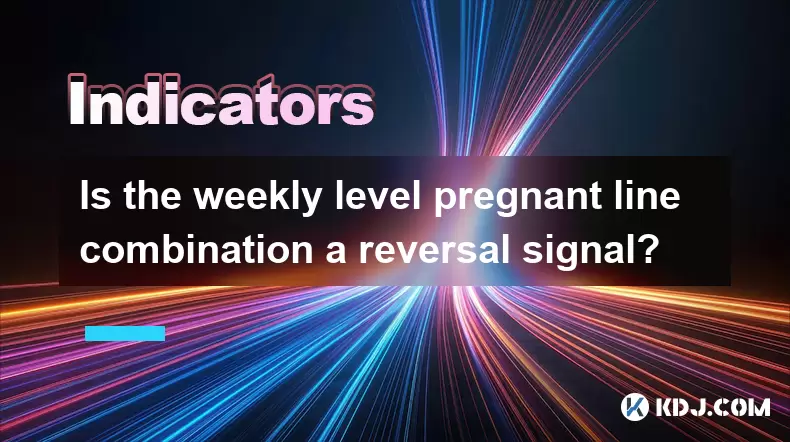
What Is a Weekly Level Pregnant Line in Cryptocurrency Trading?
In technical analysis, the weekly level pregnant line is a candlestick pattern that often captures traders' attention due to its potential implications for market direction. This formation occurs when a candle with a small body appears between two larger candles of opposite directions. The term 'pregnant' refers to the visual appearance of the candles—where the smaller middle candle seems nestled inside the range of the prior and following candles.
The weekly level pregnant line combination typically emerges on weekly timeframes, which are considered more reliable by many traders due to their reduced noise compared to shorter intervals like hourly or daily charts. When this pattern forms at key support or resistance levels, it may suggest an impending reversal in price action.
How to Identify a Weekly Level Pregnant Line Pattern
Identifying this candlestick configuration requires precise observation of candle formations over consecutive weeks:
- A strong bullish or bearish candle appears first.
- The next week’s candle has a significantly smaller real body, regardless of color.
- This smaller-bodied candle opens and closes within the range of the previous candle.
- The third candle moves in the opposite direction of the first one, often closing beyond the midpoint of the first candle’s range.
Traders should pay close attention to volume during this formation. A decrease in volume during the middle candle followed by an increase in the third can serve as a confirmation signal of a potential trend reversal.
Does the Weekly Level Pregnant Line Indicate a Reversal?
The core question revolves around whether this candlestick pattern serves as a reliable reversal indicator in cryptocurrency markets. While no single candlestick pattern guarantees a reversal, the weekly level pregnant line is widely regarded among technical analysts as a strong suggestion of such a possibility.
This is especially true when the pattern appears near significant price zones such as Fibonacci retracement levels, historical support/resistance areas, or moving average crossovers. In these contexts, the weekly level pregnant line may indicate indecision followed by a shift in market sentiment.
For example, if Bitcoin (BTC) shows a bullish weekly level pregnant line pattern forming near a long-term support level, traders might interpret it as a sign that sellers are losing control and buyers are preparing to push prices higher.
How to Trade Using the Weekly Level Pregnant Line
Trading based on this pattern involves several critical steps:
- Identify the pattern accurately: Confirm that the structure matches the definition of a weekly level pregnant line.
- Check confluence factors: Ensure that the pattern forms near a known support or resistance zone, trendline, or key moving average.
- Wait for confirmation: Allow the third candle to fully form and observe whether it breaks out in the expected reversal direction.
- Set entry points: Enter the trade once the reversal candle closes above/below a key level, depending on the direction.
- Place stop-loss orders: Set stops just beyond the low/high of the first large candle to manage risk effectively.
- Determine profit targets: Use measured move projections or Fibonacci extensions to set realistic take-profit levels.
Using this approach allows traders to incorporate both candlestick signals and broader market context into their decision-making process.
Why the Weekly Level Pregnant Line Works in Crypto Markets
Cryptocurrency markets exhibit high volatility and strong emotional swings, making them particularly suited to candlestick pattern analysis. The weekly level pregnant line works well because it reflects a pause in momentum followed by a potential change in leadership between bulls and bears.
Unlike traditional markets where institutional trading dominates, crypto markets operate 24/7 and are heavily influenced by retail traders and algorithmic bots. These dynamics often amplify candlestick patterns, including the weekly level pregnant line, as they tend to reflect collective trader psychology more clearly.
Additionally, many crypto assets experience cyclical behavior, where repeated tests of key price levels lead to recognizable chart patterns. The weekly level pregnant line becomes even more potent when combined with other tools such as RSI divergence, MACD crossovers, or volume spikes.
Common Misinterpretations and Pitfalls
Despite its usefulness, the weekly level pregnant line is not foolproof. One common mistake is treating every instance of this pattern as a guaranteed reversal setup. Traders must avoid entering trades solely based on candlestick formations without confirming them with additional indicators or price action signals.
Another pitfall is failing to consider the broader trend. If the pattern appears in a strong trending environment, it may only represent a temporary consolidation rather than a full reversal. Therefore, assessing the strength and duration of the prevailing trend is crucial before acting on this signal.
Lastly, some traders overlook the importance of timeframe alignment. Since this is a weekly-level pattern, intraday traders shouldn't expect immediate results. Patience and proper position sizing are essential when waiting for the pattern to play out over multiple weeks.
Frequently Asked Questions (FAQs)
What is the difference between a weekly level pregnant line and a harami pattern?While both are candlestick reversal patterns involving a small-bodied candle between two larger ones, the weekly level pregnant line typically includes a third candle that moves in the opposite direction of the first, whereas the harami does not require this third confirmation candle.
Can the weekly level pregnant line be used in day trading?Although primarily observed on weekly charts, variations of this pattern can appear on lower timeframes. However, due to increased volatility and noise, the reliability of the weekly level pregnant line decreases in day trading scenarios unless confirmed by strong confluence factors.
How often does the weekly level pregnant line occur in crypto markets?It's relatively rare on weekly charts, especially for major cryptocurrencies like BTC and ETH. Its scarcity makes each occurrence potentially more meaningful when it aligns with other technical signals.
Is the weekly level pregnant line more effective in bull or bear markets?Its effectiveness depends on the surrounding market structure. In sideways or consolidating phases, the weekly level pregnant line may offer clearer reversal signals, while in strong trends, it may act more as a continuation pattern or temporary pullback.
Disclaimer:info@kdj.com
The information provided is not trading advice. kdj.com does not assume any responsibility for any investments made based on the information provided in this article. Cryptocurrencies are highly volatile and it is highly recommended that you invest with caution after thorough research!
If you believe that the content used on this website infringes your copyright, please contact us immediately (info@kdj.com) and we will delete it promptly.
- Bitcoin Faces Identity Crisis as Speculators Flock to Prediction Markets and Ultra-Short Options
- 2026-02-02 00:30:06
- MGK and Jelly Roll Honor Ozzy Osbourne at Pre-Grammy Gala, Sparking Fan Frenzy
- 2026-02-02 00:50:02
- Super Bowl Coin Flip: Unpacking the Prediction Power of Heads or Tails
- 2026-02-02 01:30:01
- Litecoin Price Cracks 9-Year Floor Amidst Market Breakdown: What's Next for the OG Crypto?
- 2026-02-02 01:20:02
- Crypto News, Cryptocurrency Markets, Latest Updates: A Topsy-Turvy Start to 2026
- 2026-02-02 01:15:01
- New York Minute: LivLive Presale Ignites, While Solana Navigates Choppy Waters
- 2026-02-02 01:15:01
Related knowledge
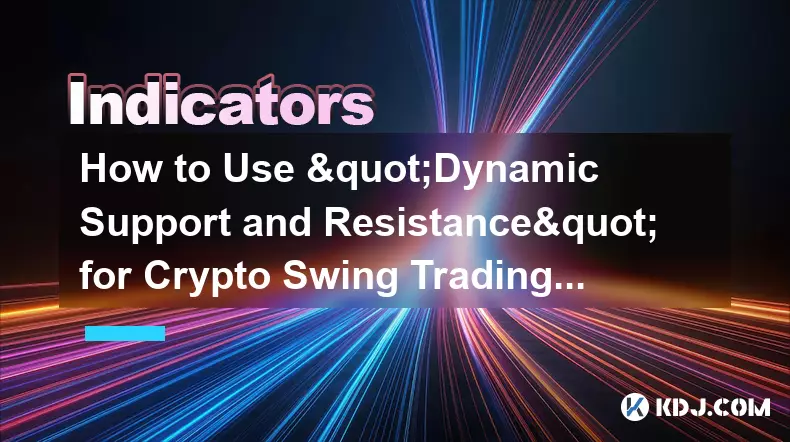
How to Use "Dynamic Support and Resistance" for Crypto Swing Trading? (EMA)
Feb 01,2026 at 12:20am
Understanding Dynamic Support and Resistance in Crypto Markets1. Dynamic support and resistance levels shift over time based on price action and movin...
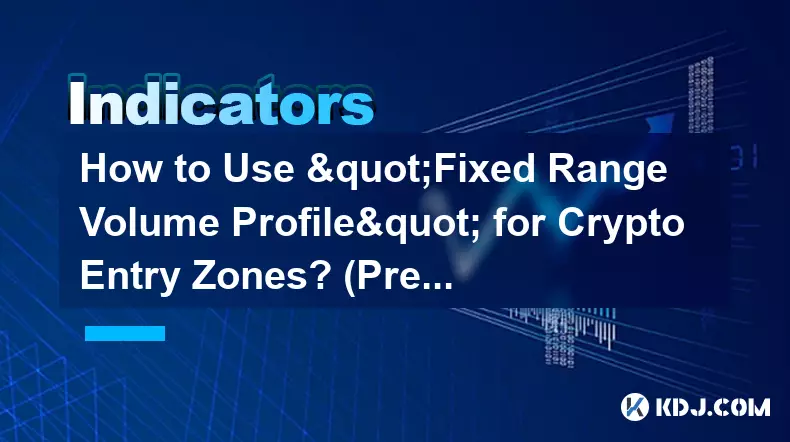
How to Use "Fixed Range Volume Profile" for Crypto Entry Zones? (Precision)
Feb 01,2026 at 10:19pm
Understanding Fixed Range Volume Profile Mechanics1. Fixed Range Volume Profile (FRVP) maps traded volume at specific price levels within a defined ti...
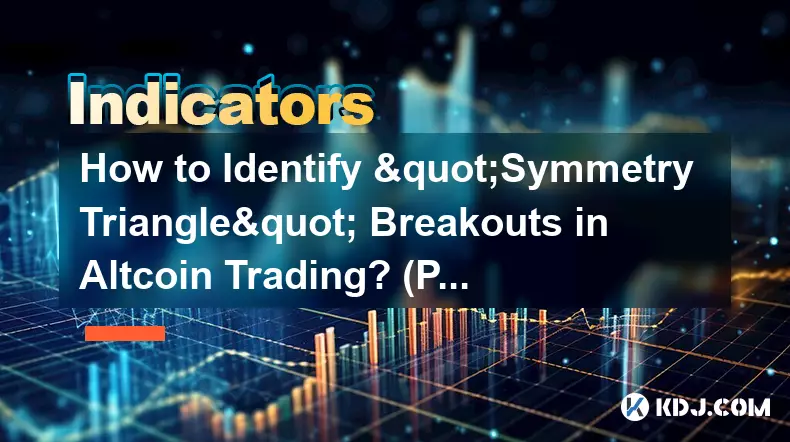
How to Identify "Symmetry Triangle" Breakouts in Altcoin Trading? (Patterns)
Feb 01,2026 at 01:39pm
Symmetry Triangle Formation Mechanics1. A symmetry triangle emerges when price action consolidates between two converging trendlines—one descending an...
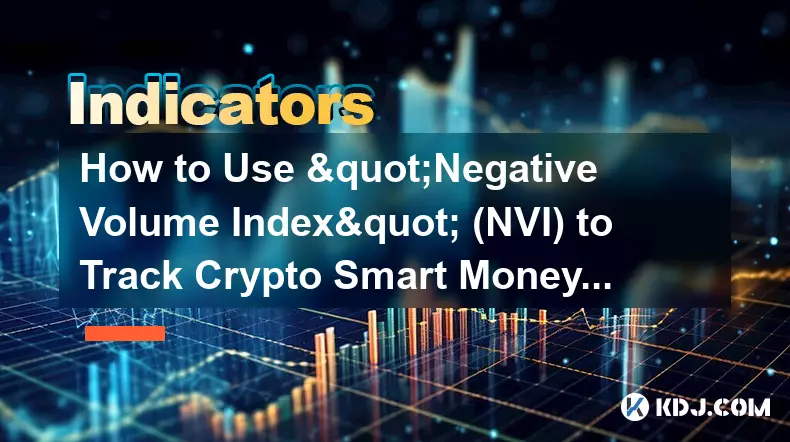
How to Use "Negative Volume Index" (NVI) to Track Crypto Smart Money? (Pro)
Feb 01,2026 at 02:40am
Understanding NVI Mechanics in Crypto Markets1. NVI calculates cumulative price change only on days when trading volume decreases compared to the prio...

How to Spot "Absorption" in Crypto Order Books? (Scalping Technique)
Feb 01,2026 at 08:39pm
Understanding Absorption Mechanics1. Absorption occurs when large buy or sell orders repeatedly appear and vanish at the same price level without trig...
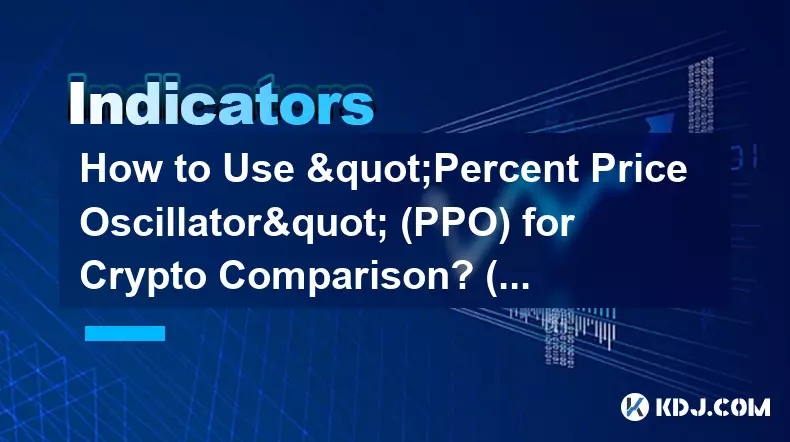
How to Use "Percent Price Oscillator" (PPO) for Crypto Comparison? (Strategy)
Feb 01,2026 at 01:59am
Understanding PPO Mechanics in Volatile Crypto Markets1. The Percent Price Oscillator calculates the difference between two exponential moving average...

How to Use "Dynamic Support and Resistance" for Crypto Swing Trading? (EMA)
Feb 01,2026 at 12:20am
Understanding Dynamic Support and Resistance in Crypto Markets1. Dynamic support and resistance levels shift over time based on price action and movin...

How to Use "Fixed Range Volume Profile" for Crypto Entry Zones? (Precision)
Feb 01,2026 at 10:19pm
Understanding Fixed Range Volume Profile Mechanics1. Fixed Range Volume Profile (FRVP) maps traded volume at specific price levels within a defined ti...

How to Identify "Symmetry Triangle" Breakouts in Altcoin Trading? (Patterns)
Feb 01,2026 at 01:39pm
Symmetry Triangle Formation Mechanics1. A symmetry triangle emerges when price action consolidates between two converging trendlines—one descending an...

How to Use "Negative Volume Index" (NVI) to Track Crypto Smart Money? (Pro)
Feb 01,2026 at 02:40am
Understanding NVI Mechanics in Crypto Markets1. NVI calculates cumulative price change only on days when trading volume decreases compared to the prio...

How to Spot "Absorption" in Crypto Order Books? (Scalping Technique)
Feb 01,2026 at 08:39pm
Understanding Absorption Mechanics1. Absorption occurs when large buy or sell orders repeatedly appear and vanish at the same price level without trig...

How to Use "Percent Price Oscillator" (PPO) for Crypto Comparison? (Strategy)
Feb 01,2026 at 01:59am
Understanding PPO Mechanics in Volatile Crypto Markets1. The Percent Price Oscillator calculates the difference between two exponential moving average...
See all articles










































































